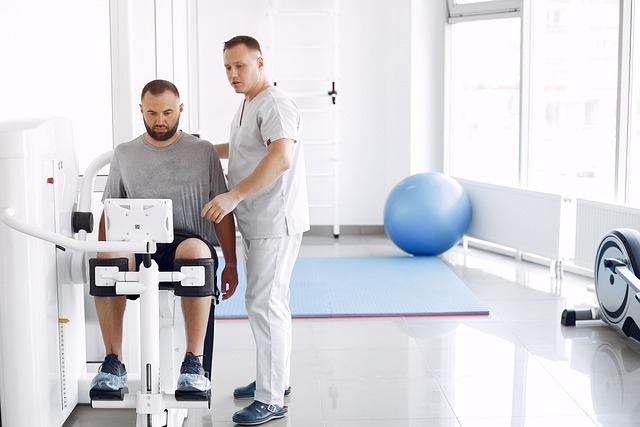In response to rising concerns about addiction among healthcare professionals, specialized luxury physician addiction treatment programs have emerged as a vital solution. These programs cater to the unique challenges faced by physicians and medical staff, including high-stress work environments and demanding schedules, offering safe spaces for recovery. Combining evidence-based therapy, stress management, and peer support, these tailored programs address both addiction and its underlying causes, promoting long-term wellness. Physician-led addiction treatment emphasizes the role of specialized professionals in providing effective care, leveraging advanced therapies and personalized approaches to enhance recovery outcomes and improve patient care within the healthcare system.
In the demanding world of healthcare, physicians and medical professionals face unique challenges that can contribute to stress, burnout, and, in some cases, addiction. With increasing awareness of the prevalence and impact of addiction within this demographic, specialized luxury treatment programs have emerged as a vital solution. This article explores physician addiction treatment, focusing on understanding the specific needs of these individuals, effective holistic approaches, and proven methods for long-term recovery.
- Understanding the Unique Needs of Physicians
- The Prevalence and Impact of Addiction in Healthcare Professionals
- Specialized Programs: A Holistic Approach to Recovery
- Effective Treatment Methods for Physician Addiction
- Supportive Community and Ongoing Care for Long-Term Success
Understanding the Unique Needs of Physicians

In the high-pressure world of medicine, physicians and healthcare professionals often face unique challenges that can lead to stress, burnout, and even addiction. Understanding these needs is crucial in developing specialized luxury treatment programs tailored for this demographic. These individuals juggle demanding schedules, emotional toll, and a constant need for self-reliance, which can make seeking help an intimidating prospect.
Therefore, exclusive programs focusing on physician addiction treatment or healthcare professional recovery are vital. Such initiatives not only offer a safe space but also provide specialized assistance to address the complex issues these professionals encounter. Medical professional treatment should be designed to foster a sense of community, encouraging peers to support and guide one another through recovery, ultimately enhancing their ability to serve patients effectively while prioritizing their well-being.
The Prevalence and Impact of Addiction in Healthcare Professionals

Addiction among healthcare professionals, particularly physicians, is a growing concern that cannot be overlooked. The demanding nature of their work—long hours, high-stress environments, and constant exposure to trauma—can contribute to a heightened risk of substance abuse. Studies indicate that healthcare workers, including doctors and nurses, face higher rates of addiction compared to the general population, with prescription drug misuse being a significant issue within this demographic.
The impact of physician addiction is far-reaching. It can lead to impaired patient care, legal consequences, and even loss of medical licenses. Moreover, it affects not only individual lives but also the overall integrity of the healthcare system. Accessing specialized luxury treatment programs designed for physicians and other healthcare professionals is crucial in addressing this challenge. These programs offer comprehensive medical professional treatment, focusing on both the addiction and its underlying causes, ultimately fostering successful healthcare professional recovery.
Specialized Programs: A Holistic Approach to Recovery

Specialized programs designed for physicians and healthcare professionals take a holistic approach to addiction recovery, recognizing the unique challenges faced by those in these demanding careers. These programs understand that treating medical professionals requires a nuanced understanding of their high-stress environments, intense work schedules, and the potential impact of burnout on mental health. As such, they offer tailored interventions that address not only the addiction but also the underlying factors contributing to it.
By integrating evidence-based therapeutic techniques with stress management strategies, mindfulness practices, and peer support networks, these specialized programs foster a comprehensive healing environment. Healthcare professionals are encouraged to prioritize self-care, develop healthier coping mechanisms, and build resilience against future challenges. This holistic approach not only aids in overcoming addiction but also promotes long-term wellness, ensuring medical professionals can continue to provide exceptional patient care with renewed passion and focus.
Effective Treatment Methods for Physician Addiction

Effective treatment methods for physician addiction are crucial to ensuring healthcare professionals receive the best care possible while addressing their struggles. Specialized programs tailored for physicians and medical staff often incorporate a combination of evidence-based practices, including cognitive behavioral therapy (CBT), motivational interviewing, and 12-step programs adapted for their unique needs. These approaches help healthcare providers confront underlying issues, develop coping strategies, and foster personal growth.
One innovative approach within physician addiction treatment is peer support and mentorship, where recovered medical professionals guide and assist their colleagues in recovery. This network of support not only facilitates healing but also cultivates a culture of resilience and understanding within the medical community, encouraging open conversations about mental health challenges and fostering a safer environment for all healthcare professionals. Additionally, integrating medical assistance and resources specifically designed for healthcare professional treatment ensures access to comprehensive care, enhancing the likelihood of successful recovery and long-term wellness.
Supportive Community and Ongoing Care for Long-Term Success







